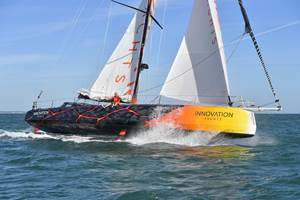DETI research project develops digital tools to support sustainable composites manufacturing
Program seeks to solve U.K. design and manufacturing process digitalization challenges such as the eco-meter for visualizing the carbon footprint of composite structures during manufacture.

Photo Credit: DETI
As part of a two-year program, research, innovation and skills initiative Digital Engineering Technology & Innovation (DETI, Bristol, U.K.) has developed several digital technologies to help U.K. manufacturers achieve better sustainability. This includes a visualization tool that displays the carbon emissions of composite parts during manufacture in real-time; augmented reality that can detect faults quickly on in-service wind turbines; and machine learning (ML) models that can capture and correct errors during the manufacture of an aircraft wing, all of which is detailed in the partnership’s report.
Presenting nine key results, Digital Now reportedly introduces industry firsts including the DETI digital eco-meter which allows engineers to visualize the carbon footprint during manufacture of composite components and structures, such as a carbon fiber aircraft wing or car component. With the eco-meter, DETI says, engineers are able to better understand the environmental impact of the parts they are making to improve processes or cut emissions during manufacture.
DETI has also revealed the successful trial of a digital system that monitors component build quality in real-time. Aimed at high-performance composites manufacture which must be cured in ovens, the system allows vital interventions to be made when it is impossible to visually monitor the build quality. In aerospace, marine and automotive sectors that use this type of manufacturing technique heavily, this tool could potentially improve sustainability and time to market substantially.
Part of the West of England Combined Authority’s commitment to accelerating innovation, DETI is delivered by the National Composites Centre (NCC), the Centre for Modelling & Simulation, Digital Catapult, the University of the West of England, the University of Bristol and the University of Bath, and funded by the Combined Authority with co-investment from the High Value Manufacturing Catapult and industry.
DETI’s vision is to help U.K. manufacturers achieve better through-life product sustainability, efficiency and low-carbon processes using a series of industry test beds that exploit the power of emerging technologies like 5G, quantum key distribution and advanced sensorization. DETI is also working closely with schools and colleges in the West of England on inclusive STEM careers outreach.
The partnership has also shared its work in augmented reality, reporting on a novel software system developed by DETI engineers that helps improve fault detection within a manufactured product, another example of DETI’s commitment to cutting waste and improving efficiency. Engineers have also tested a range of ‘off-the-shelf’ augmented reality and virtual reality (VR) tools to trial virtual 3D design applications creating best practice guidelines for businesses that want to explore the realms of immersive technology.
Also included in the report is DETI’s U.K.-first “Quantum Key Distribution” network engineered in partnership with BT (London, U.K.) and Toshiba (Tokyo, Japan). Offering a rapid and secure communications network has reportedly enabled engineers and researchers to share live information, design data and manufacture part of a product remotely, delivering a digital supply chain.
Finally, the Digital Now report contains key learnings from the West of England-based DETI Skills Inspire & Transform programs, working to ensure the future workforce is digital-ready. It also details plans for secondary school digital engineering resources focusing on sustainability which will be deployed in 2021.
With another year remaining, DETI will be switching its focus to proving and enhancing many of these new digital tools using the private 5G test bed built in partnership with the 5G-ENCODE program, hosted at the NCC.
For information about collaborating or partnering with DETI contact deti@nccuk.com
Related Content
Composites end markets: Sports and recreation (2025)
The use of composite materials in high-performance sporting goods continues to grow, with new advancements including thermoplastic and sustainability-focused materials and automated processes.
Read MoreEuropean boatbuilders lead quest to build recyclable composite boats
Marine industry constituents are looking to take composite use one step further with the production of tough and recyclable recreational boats. Some are using new infusible thermoplastic resins.
Read MoreCorebon induction heating
This sidebar to CW’s August 2024 feature article reviews this technology for more efficient composites manufacturing and why it aligns with Koridion active core molding.
Read MoreBio-based, fire-resistant composites become mainstream
Projects use Duplicor prepreg panels with highest Euroclass B fire performance without fire retardants for reduced weight, CO2 footprint in sustainable yet affordable roofs, high-rise façades and modular housing.
Read MoreRead Next
Ultrasonic welding for in-space manufacturing of CFRTP
Agile Ultrasonics and NASA trial robotic-compatible carbon fiber-reinforced thermoplastic ultrasonic welding technology for space structures.
Read MoreScaling up, optimizing the flax fiber composite camper
Greenlander’s Sherpa RV cab, which is largely constructed from flax fiber/bio-epoxy sandwich panels, nears commercial production readiness and next-generation scale-up.
Read MoreCutting 100 pounds, certification time for the X-59 nose cone
Swift Engineering used HyperX software to remove 100 pounds from 38-foot graphite/epoxy cored nose cone for X-59 supersonic aircraft.
Read More












